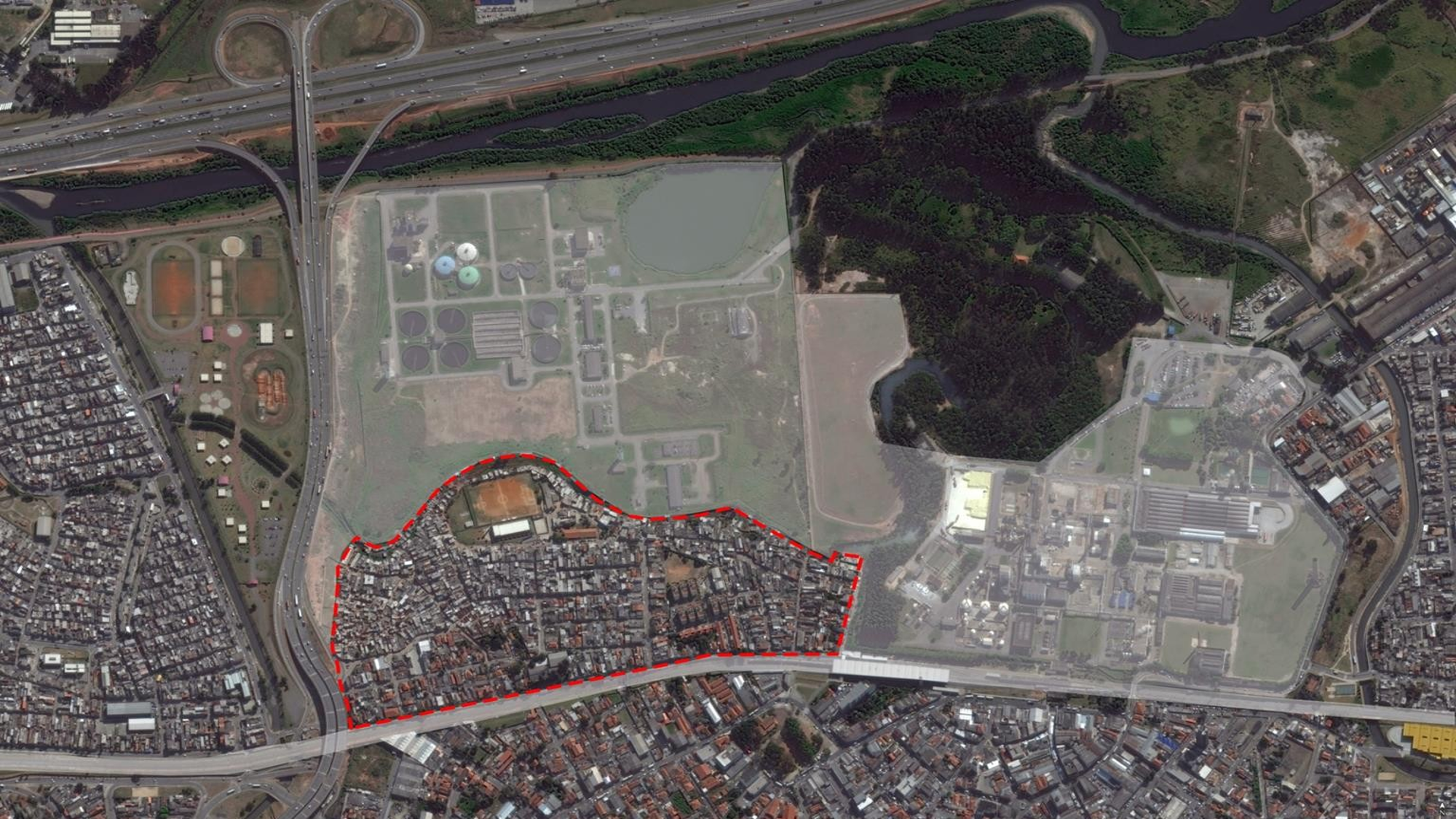The ‘What makes a good place?’ project is supported by Fundação Tide Setubal (FTS), and Fundação Itaú Social, in the Jardim Lapenna neighbourhood in São Paulo, Brazil. The project will see the contribution of researchers Professor Gareth Jones (Director, LSE LACC), Dr Mara Nogueira (LSE LACC), Dr Matthew Richmond (LSE LACC), and Dr Aiko Ikemura Amaral (LSE LACC), as well as an advisory group.

Photo: Aerial view with demarcated area indicating Jardim Lapenna.
Building on the local neighbourhood plan, FTS seeks to bring about measurable improvements to the quality of life, wellbeing, and local living conditions in the area. This effort will focus on three main pillars: Urban infrastructure, community leadership development, and entrepreneurship.
The LSE LACC methodological approach ventures to understand how residents and other actors relate to Jardim Lapenna as a place. The project will be co-produced with ‘communities of interest’, including children and young people, the elderly, and civil society organisations.
The project sets out to understand notions of ‘place’ from three perspectives:
- Inequalities and Cohesion: How inequalities ‘work’ in terms of social dynamics, such as gender, race, and age, and have consequences for intra-neighbourhood networks, cohesiveness, and cooperation.
- Territoriality and Space: Map out how residents and institutions navigate with the city, for example in terms of work, resources, family relations, bureaucracies, civil society involvements.
- Young People and Place: Consider how young people relate to the neighbourhood, through its institutions, and to the wider city.
The overall aim is to test the methodology and its potential to capture perceptions of well-being, setting the groundwork for longer-term design, monitoring, and evaluation of future public and private interventions.
The specific objectives of the project are:
- To assess the record of social urbanism-style interventions and their potential contribution to territorial transformation and resident well-being in Jardim Lapenna.
- To identify a set of criteria to assess the notion of ‘what makes a place a good place’ for all.
- To co-produce a set of participatory methodologies to examine these criteria in Jardim Lapenna.
- Briefing Paper I: Social Urbanism and the Making of Place
- Briefing Paper II: Methodologies to Assess Jardim Lapenna as a ‘Good Place for all’
- Briefing Paper III: Imagined Futures: young peoples’ visions for Jardim Lapenna
- Briefing Paper IV: Territorialising Jardim Lapenna: inequalities, networks, and porosity
- Executive Summary and Recommendations, presentation to Partner Group and relevant stakeholders
Created in 2006, Fundação Tide Setubal (FTS) is a non-governmental, family-based organisation that works with the mission of fostering initiatives that promote social justice and the sustainable development of urban peripheries and contribute to tackling the socio-spatial inequalities of large cities, in articulation with various agents of civil society, research institutions, the State and the market.
With ten years of experience in São Miguel Paulista, east of São Paulo, FTS believes that local development cannot take place without the empowerment and participation of the communities involved. It takes an active community and the search for local solutions towards the integration of strong and consistent social policies.
Fundação Itaú Social is a hub for educational development. Since 1993 they have developed several programmes that are committed to improve public education in Brazil.
Their mission is to develop, implement and share social technologies in order to contribute to the improvement of Brazilian public education. Their vision is to be the hub of an educational development that articulates, aggregates and produces knowledge with a view to consolidating education and protection for all children, adolescents and youth as priorities of the society.
Their programmes are structured under two pillars:
1. Education professionals training
2. Strengthening of civil society
Photo: Youth in São Miguel Paulista, Brazil. Circuito Fora do Eixo, 2012, Flickr. CC BY-SA 2.0.